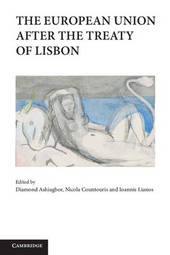
|
The European Union after the Treaty of Lisbon
Hardback
Main Details
| Title |
The European Union after the Treaty of Lisbon
|
| Authors and Contributors |
Edited by Diamond Ashiagbor
|
|
Edited by Nicola Countouris
|
|
Edited by Ioannis Lianos
|
| Physical Properties |
| Format:Hardback | | Pages:344 | | Dimensions(mm): Height 236,Width 159 |
|
| ISBN/Barcode |
9781107017573
|
| Classifications | Dewey:341.2422 |
|---|
| Audience | | Tertiary Education (US: College) | |
|---|
|
Publishing Details |
| Publisher |
Cambridge University Press
|
| Imprint |
Cambridge University Press
|
| Publication Date |
16 April 2012 |
| Publication Country |
United Kingdom
|
Description
This volume of essays casts light on the shape and future direction of the EU in the wake of the Lisbon Treaty and highlights the incomplete nature of the reforms. Contributors analyse some of the most innovative and most controversial aspects of the Treaty, such as the role and nature of the EU Charter of Fundamental Rights and the relationship between the EU and the European Court of Human Rights. In addition, they reflect on the ongoing economic and financial crisis in the Euro area, which has forced the EU Member States to re-open negotiations and update a number of aspects of the Lisbon 'settlement'. Together, the essays provide a variety of insights into some of the most crucial innovations introduced by the Lisbon Treaty and in the context of the adoption of the new European Financial Stability Mechanism.
Author Biography
Diamond Ashiagbor is Professor of Labour Law at the School of Oriental and African Studies, University of London. Nicola Countouris is a lecturer in law and a co-director of the Centre for Law and Governance in Europe at the Faculty of Laws, University College London. Ioannis Lianos is a reader in European Union law and competition law and economics at the Faculty of Laws, University College London, where he is also the Director of the Centre for Law, Economics and Society and a co-director of the Centre for Law and Governance in Europe.
Reviews'The Treaty of Lisbon limped into force in 2009, stripped of constitutional flourish and accompanied by a sense of political exhaustion. And yet the economic and financial crisis (in particular) has made vivid how much more needs to be done. This volume successfully captures the incomplete yet dynamic character of the Lisbon reforms: it is splendidly forward-looking.' Stephen Weatherill, University of Oxford
|